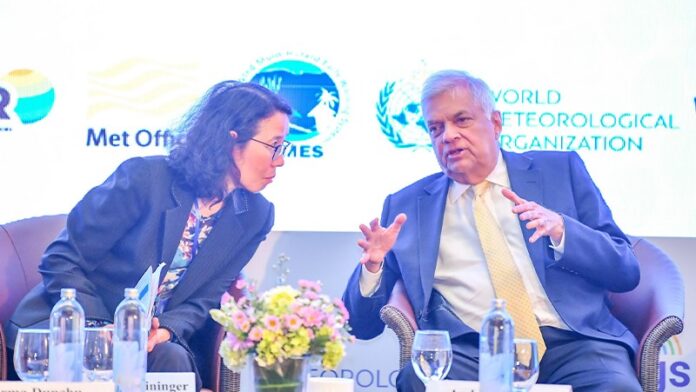[ad_1]
ECONOMYNEXT – Sri Lanka is committed to supporting regional efforts in climate change mitigation and adaptation, and will enhance its meteorological organizations, its president has said.
“The economic repercussions of climate change could lead to potential GDP losses of up to 2 percent in low-income countries,” Ranil Wickremesinghe told the South Asia Hydromet Forum (SAHF) IV on Tuesday (6), according to a statement by his media division.
The forum aims to facilitate discussions and collaborations on hydrology and meteorology-related initiatives in South Asia. SAHF connects National Meteorological and Hydrological Service providers (NMHSs) from the region to promote data and knowledge exchange.
Wickremesinghe pointed out the necessity of a comprehensive Hydromet regional network to effectively address climate change-related challenges, particularly in South Asia, where the adverse effects are mostly felt. The island has recently struggled with heavy rainfall and resultant landslides and flooding.
Wickremesinghe told the forum that the country plans to establish an international climate change university, designed to offer postgraduate programs akin to those provided by institutions like the East West Centre in Hawaii.
He reiterated his proposal for the creation of a tropical belt as a carbon sink, discussed during COP 28 in Dubai, and said it was important to facilitate private sector investment in such initiatives.
“While traditional sources of aid may not suffice, attracting private sector investments could yield substantial benefits for all parties involved,” he was quoted as saying.
Co-Chair of the South Asia Hydromet Forum (SAHF) and Director of the National Centre for Hydrology and Meteorology in Bhutan, Karma Dupchu, Director of the South Asia Region at the World Bank (WB), Dina Umali-Deininger, and High Commissioner of the United Kingdom, Andrew Patrick, convened the forum. (Colombo/Feb6/2024)
[ad_2]
Source link


